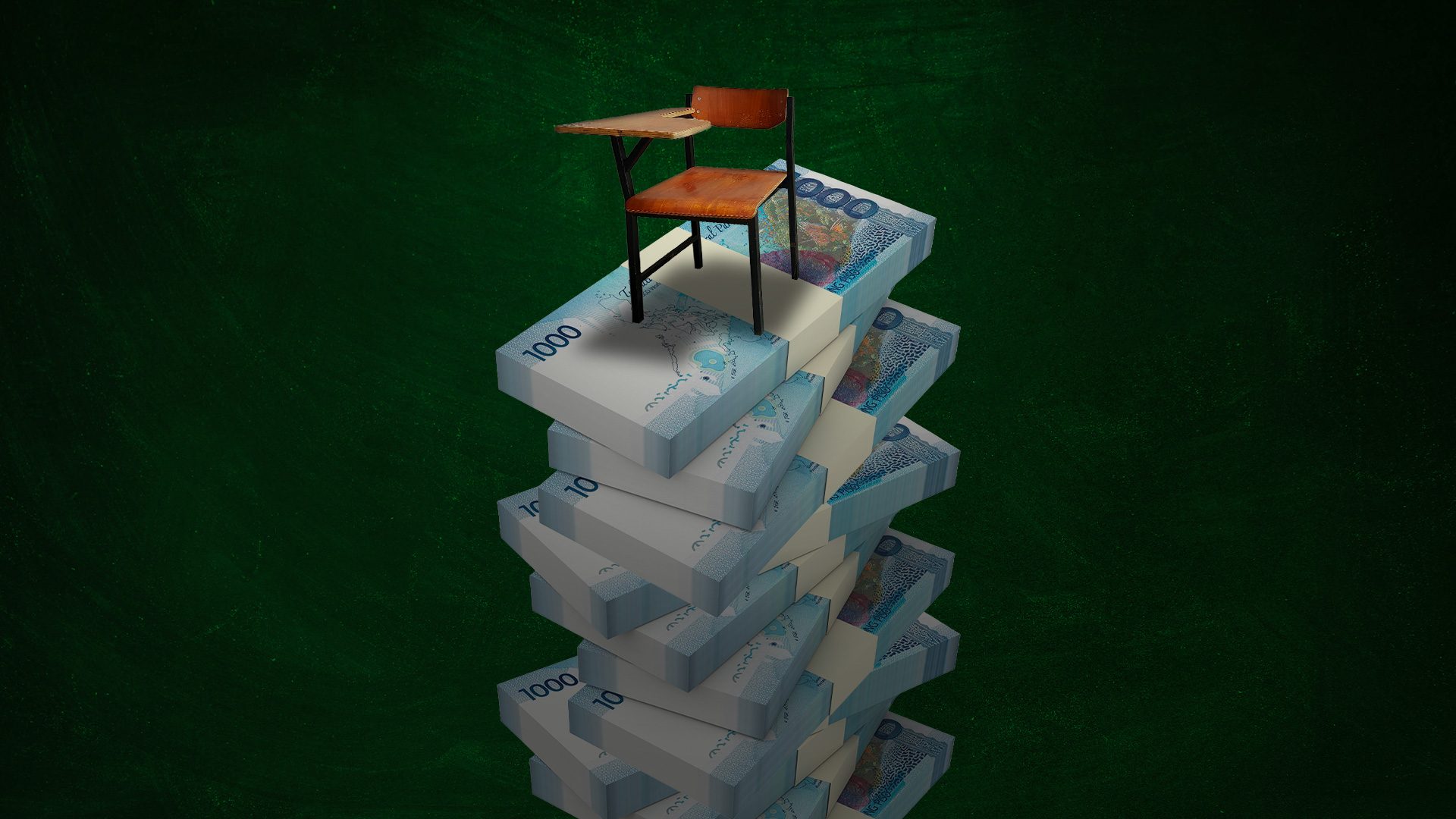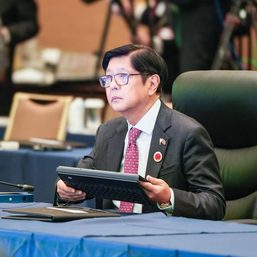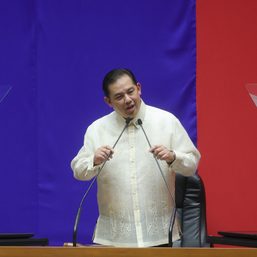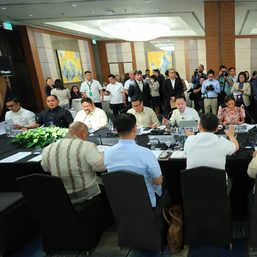SUMMARY
This is AI generated summarization, which may have errors. For context, always refer to the full article.

MANILA, Philippines – Early this month, Vice President and Department of Education (DepEd) Secretary Sara Duterte defended the inclusion of the proposed P150 million worth of confidential funds in the education department’s 2024 budget.
In an ambush interview, Duterte told reporters that “education is intertwined with national security.”
But asked how the confidential funds would be spent, Duterte only mentioned the existence of a “confidential” joint memorandum outlining the intended purposes and mechanism for utilizing the funds.
“Due to its confidential nature, we are unable to delve into the details of how it is employed in operations,” she explained.
House Deputy Minority Leader and ACT Teachers Representative France Castro even criticized the P150-million confidential funds of the education department, calling the department a “department of surveillance.”
In response to criticisms, Duterte said the fate of the allocated budget for confidential funds lies with Congress, which easily granted her same request during budget deliberations in 2022.
But exactly how big is P150 million, and how could it be better spent to improve the country’s education system?
First time in DepEd history
Throughout its history, DepEd had never been allocated a budget for confidential and intelligence funds until Duterte took the helm.
In her first term as education secretary, Congress authorized the allocation of P150 million worth of confidential and intelligence funds in DepEd’s 2023 budget, despite opposition from some lawmakers.
“The threats to the learning environment, safety, and security of DepEd personnel are interlocking with the mandate of support to the national security of civilian offices,” DepEd said in a statement in 2022.

Now, the justification for the proposed P150-million confidential funds for the 2024 budget appears to echo a recurring theme.
During an interview with Super Radyo DZBB, DepEd Spokesperson and Undersecretary Michael Poa said the funds will be used to gather intelligence regarding “illicit recruitment” within educational institutions and to curb such practices.
“Recently, talaga namang kailangan nating aminin na maraming mga intel activities, recruitment, na nangyayari sa ating mga paaralan, pati na rin ang seguridad ng ating mga learners and mga teachers and that is why kailangan natin ng pondo para po makakuha tayo ng kaukulang information,” Poa said.
(Recently, we really need to admit that there are numerous intelligence activities and recruitment happening in our schools, [and we need to pay attention to] the safety of our learners and teachers. That is why we need funding to obtain appropriate information.)
However, Sonny Africa, executive director of Ibon Foundation, said the allocation for confidential funds in the DepEd budget raises doubts about its legitimacy.
“We have to wonder what they are meant to be used for; clearly, there is no intelligence function within the mandate of DepEd. Even if there were potential benefits related to national security concerns, other government agencies are responsible for such matters,” Africa said.
Zy-za Suzara, executive director of iLead, a think-tank that monitors the national budget, said the existence of confidential funds raises concerns about transparency and accountability in budget allocation and spending.
“When we talk about public funds, it is not the allocation per se that matters. But ‘yung ina-allocate ba natin ay para ba sa tamang purpose (But rather, what we allocate is for the right purpose) and we want that to be done in a transparent and accountable manner,” she said.
This was echoed by Africa who said, “If there is a legitimate need for confidential funds, I think the DepEd secretary should explain to the public what are the legitimate needs.”
Budget slash
While Duterte appears to be confident that the confidential funds will breeze through Congress, the budget for some special provisions in the department may be slashed in 2024, despite DepEd getting the lion’s share of the proposed P5.7-trillion national budget next year.
For instance, the National Academy of Sports, a state-operated sports institution in the Philippines, is facing a 45% budget slash – from the approved P356.8-million budget in 2023 to just P195.2 million in 2024.
The Early Childhood Care and Development Council, an attached agency of DepEd, also faces a budget cut – from P291.8-million in 2023 to P221.2-million in 2024, representing a 24% decline.
The National Museum of the Philippines, which is also an attached agency of DepEd and serves as the primary custodian of Philippine cultural heritage, will similarly suffer a P189-million budget reduction in 2024.

Other institutions grappling with budget cuts include the National Book Development Board, the Philippine High School for the Arts, and the National Council for Children’s Television.
Funding what matters most
Even though the P150-million confidential funds constitute only about 0.02% of DepEd’s proposed P759-billion total budget in 2024, Africa said this sends a signal about the education department’s leadership.
“The real measure of the size of the education budget is how it relatively addresses the needs. If we are still lacking tens of thousands of classrooms and teachers, you can’t help but wonder about the prioritization of confidential funds, unrelated to DepEd’s budget,” he said.
Suzara stressed that budget allocations should pay attention to the country’s most pressing needs.
“Budget allocation and reallocation is a zero-sum game. When you allocate funds to a specific program, it implies that funding for something else is reduced. So, with the P150-million, you can consider other potential actions or projects,” she said.
The Alliance of Concerned Teachers (ACT) suggested that rather than assigning confidential and intelligence funds to the Department of Education, the government could instead utilize these resources to construct additional classrooms.
In her Basic Education Report on January 30, Duterte said their goal is to construct 6,000 classrooms using its P15.6-billion budget. This means that each classroom costs about P2.6 million.
Using this figure, the P150-million confidential funds can instead be used to build 57 classrooms, especially in far-flung communities.

This substantial sum can also be used to address gaps in education resources, such as 4.5 million textbooks that cost P33 each, the annual salaries of 462 recently-employed teachers at Salary Grade 11 rates (amounting to P27,000), or the provision of 250,000 subsidized public school uniforms.
“P150 million won’t go very far but it can add to hiring more teachers and building more classrooms. If you wanted to put it to more effective use, I think the Deped should genuinely assess where the source of the education crisis is,” Africa said.
A 2022 study by the World Bank, for example, found that learning poverty in the Philippines is among the highest in the East Asia and Pacific Region, with more than nine in 10 children unable to read basic text by age 10.
Critics have said that the government should allocate more funds to improve the quality of education in the country.
A dangerous precedent
Africa said the inclusion of confidential funds in the 2024 budget sets a perilous precedent that could impact future administrations.
“It sets a dangerous precedent because it affirms that public funds are not being used for public purposes, and the seeming entitlement of political leaders to use public funds with impunity under the guise of supposedly legitimate confidential funds usage,” he said.
The Marcos administration is requesting a total of P10.1 billion for confidential and intelligence funds in various government agencies for 2024.
A significant portion of these funds will be allocated to the offices of President Marcos and Vice President Duterte.
Suzara warned that the possibility of having confidential funds for agencies not related to national security could become the norm in succeeding administrations.
“Once it gets to the national expenditure program and then to the general appropriations act, that will be normalized, that will be the pattern in the next administration. If you keep allocating funds for non-productive purposes, sayang iyong fiscal space,” she said.
“We missed out on funding what is actually more urgent for the government to address, and in the case of DepEd, it’s the learning poverty in the country,” Suzara added. – Rappler.com
Add a comment
How does this make you feel?
![[EDITORIAL] Post-Sara Duterte resignation: Ang trahedya at ang pag-asa sa edukasyon](https://www.rappler.com/tachyon/2024/06/animated-sara-duterte-resigns-as-deped-chief-carousel.jpg?resize=257%2C257&crop_strategy=attention)
![[The Slingshot] Blunders and mess Sara left behind at DepEd](https://www.rappler.com/tachyon/2024/06/TL-Sara-Duterte-DepEd-June-24-2024.jpg?resize=257%2C257&crop_strategy=attention)


![[In This Economy] Duterte exits DepEd: Good riddance!](https://www.rappler.com/tachyon/2024/06/tl-duterte-exits-good-riddance-June-21-2024.jpg?resize=257%2C257&crop=220px%2C0px%2C720px%2C720px)





There are no comments yet. Add your comment to start the conversation.